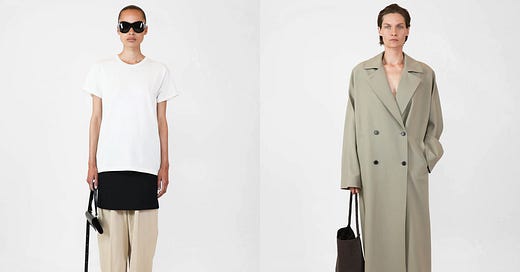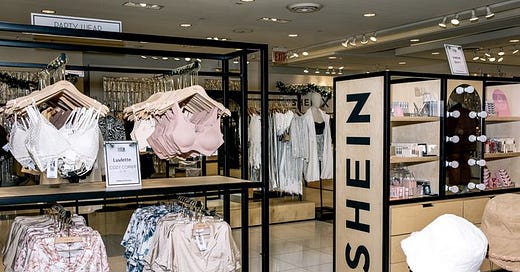

Discover more from Back Row
Should Fashion Be Political?
A discussion with journalist and critic Eugene Rabkin, who argues that fashion and politics need a divorce.
Thank you for subscribing to Back Row! This newsletter is ad-free, and powered by reader support. If you like these posts, please tell your friends about them and tap the heart up top. If you are new here, don’t forget to subscribe to get Back Row delivered to your inbox around twice a week.
I have never expected the fashion industry to have strong moral stances. Growing up in the nineties, when you hardly ever saw anyone but extremely skinny white models in runway shows and fashion magazines, cemented my belief the industry was perfectly happy to not represent or make special effort to identify with the average person. Then came the internet and along with it, our ability to express that this kind of imagery was damaging our collective psyche. I have been amazed to see diversity and inclusion actually translate to magazines and marketing images in recent years, though the industry does still seem to prefer to sell its wares on thin white women who fit a Eurocentric ideal of beauty.
Since Donald Trump’s successful run for president, the fashion industry — along with other for-profit industries — has become more political. If the business could change its imagery to include a greater variety of skin tones, backgrounds, and body types, maybe we entertained the thought as consumers that it could change the world in a bigger way, too. Now, political statements in fashion happen as a matter of course. It’s not surprising today that fashion brands crow about their commitments to “sustainability,” sell clothes to support Ukraine, and market runway shows around feminism. Never mind that the goal of corporate fashion is to sell customers as much stuff as possible, that labels could simply donate to Ukraine instead of selling merch to advertise it, and that the fashion supply chain is murky by design and rife with mistreatment of workers in factories on the other side of the world. (Just this morning, I was reading in the Guardian about H&M’s legally binding agreement to protect its factory workers from sexual harassment and violence after a 20-year-old woman who worked at one Indian supplier was found allegedly raped and murdered on farmland near her home, after her family said she experienced abuse at work. Horrifying stories like this hardly exist in a vacuum.)
Some believe that political statements by corporations are important virtue signaling. Others, like fashion journalist and critic Eugene Rabkin, argue they are hallow and cannot effect change. Rabkin has been covering fashion for around as long as I have, since 2008. He is the founder of the website StyleZeitgeist, writes a Substack, and contributes to publications like Business of Fashion. He also runs a store in Atlanta called ANT/DOTE. About a week ago, he re-posted to Instagram a story he wrote in 2015 called “Fashion and Politics Need a Divorce.” He wrote, “I think it’s a fitting time to repost this. It’s from 2015, before Trump, before [Black Lives Matter], before cancel culture went into lunatic overdrive, before this war. And yet, I maintain that this argument is valid.”
I asked him if he would discuss the piece with me and why he promoted it again now. Our discussion has been edited and condensed. I would love to know your thoughts on the mixing of fashion and politics, so please drop them in the comments so we can continue and broaden the discussion.
First, tell readers where you’re from and how you got into fashion.
I’m from Belarus. I immigrated to New York with my parents when I was 15. And I came to a part of Brooklyn where nothing ever happens, very blue collar. I got into fashion as an impressionable teenager, just watching musicians that I love how they dress. And in the late nineties, I accidentally walked into Barneys. And that's where I discovered the Belgians and the Japanese, and my entire world fell apart. I didn't realize that could be fashion. I thought fashion was like Versace and Dolce & Gabbana, which is a very immigrant aspirational story. I dug really, really deep as I think most fashion people do when they’ve really caught onto something.
But you didn’t work in fashion right away, right?
I was working on Wall Street. Nothing glamorous, just like market data, and my last job was management consulting. One day I said, I'm just not going to do that anymore. I enrolled in the New School for Social Research and I thought I would go teach English literature to high school kids after I got my degree. But then I ended up writing my thesis on fashion and magazines. I was a pretty prominent member of The Fashion Spot. I started StyleZeitgeist because I was dissatisfied with some things on the Fashion Spot. StyleZeitgeist kind of grew. When I was writing my master's thesis, [the New School was] like, “Well, we don't know what to do with you. So can you find an advisor at Parsons for your thesis?” Which I did. And then she invited me to teach me at Parsons. So I left Wall Street and I was teaching at Parsons.
And can you explain why, as you said in your piece, you think fashion and politics need a divorce?
I think that we demand from fashion too much. I think we demand from culture too much in general, but especially from fashion. I don't think fashion is equipped to deal with politics. But where we are now as a culture is that, since capitalism has achieved a complete victory over society, also empowering consumers in the process, we take that consumer mentality now, like the customer's always right — we take it into all realms of culture and professions. Now we don't really trust the government, we don't think the government is capable of things that they should be doing. And so we put our trust into corporations, but we also demand from corporations. And so fashion consumers also demand from fashion. But A) fashion is not in the business of social change, nor can it be. I think it's an absolutely ridiculous proposition. B) as a medium of expression, fashion is severely limited.
Fashion is in the business of making expensive clothes for well-off people. That's it. I would argue that I actually love that fashion is not political. I'm able to compartmentalize. My socio-political views can be here, and fashion can be here. And I actually love that it's escapist and frivolous and creative and interesting. I don't need fashion to be CNN. I have CNN over here. So that's it in a nutshell.
But to be clear, you’re talking about something separate from diversity and inclusion.
That's why I wrote with the exception of identity politics.
So you're saying yes, diversity and inclusion are important and those efforts need to continue. But what you're talking really about is like when Dior does a fashion show with signs that say “feminism.”
Selling “we should all be feminists” T-shirts for [$860] is not going to engender political change. That's what I wrote about — you are creating an illusion and actually lulling people into complacency. So it's like having both — Oh, I can go shopping at Dior and I can be politically engaged. But you also feel good about yourself because you think, Oh, I'm politically engaged. I don't have to do anything else.
That sort of reminds me of how with sustainability and environmentalism, we get into the conversation of individual action versus policy.
I argue no one really cares about sustainability in fashion anyway.
Sustainability in fashion is, in my opinion, one of the biggest marketing lies, but they're marketing it because they think that it resonates with consumers, which I think it does.
The only path to sustainability is buy less and buy better quality stuff.
It’s also legislation.
That too. Which once again, back to your earlier point, that will come from governments. That's not going to come from private enterprise because that's not their core interest. The interest of a private enterprise is to make as much money as possible.
You grew up in Belarus, how does that shape your views on these things?
I grew up with very little. That has allowed me to cherish things and to have respect for material objects. Even now I have serious trouble throwing clothes out. I have still retained that immigrant mentality that this has value. Why would you get rid of it?
You said you grew up with very little, can you be more specific?
I had two pairs of pants. I had two shirts. I had one pair of sneakers. And I had a pair of sneakers just because my dad worked in sports. So I was probably one of the few people who had Adidas Sambas in my hometown, Bobruisk.
Where do you think politics in fashion is going? This is a trends business, after all.
I think it'll stay for a while.
Why did you publish the story in 2015?
The catalyst was that Givenchy show [for spring 2016, meant to pay respect to 9/11], which I found really tone deaf. Like why is this Italian designer working for a French house preaching to us about 9/11? I worked two blocks away from the World Trade Center. I got incredibly lucky that my day started at 10, not at 9, because I would've had a whole different life. I was on the train when the first plane hit. I got as far as Brooklyn Bridge. I was like, I'm just going to be late and I'm going to walk over the bridge, it's a nice day. And I get on the bridge and I just see like, a wave of people.
If you have a stage and you're doing a fashion show and you have an audience and you are a creator, I completely understand the impulse to say something. I get it. It’s just like, ask yourself questions. Do we need Isabel Marant making [sweatshirts] with the Ukranian flag and selling them and donating proceeds — like, what for? You want to donate, donate to Ukraine directly.
That was my problem with [Balenciaga designer] Demna, too. [Author’s note: his recent show in Paris paid homage to Ukrainian refugees; Demna fled the Georgian civil war in 1993 when he was 12.] I was like, what is this? I'm from that part of the world, I'm a political refugee too. I've never, ever touted my political refugee status. I've never, ever used that to get anything. And that seemed distasteful to me. And then him and [Kim] Kardashian backstage — the cognitive dissonance of the whole thing. Why don't you do something and don't tell anyone about it? Don't make a media moment of it. And he's really good at making media moments.
Well, the public has a hard time accepting Fashion Week happening while there's a war.
How about we learn to just experience pain and just sit with it, just accept that it's okay to experience pain? Just learn to understand that there is pain in the world and there's nothing you can do about that. And that's OK.
Some people will argue that virtue signaling is important because, even if a corporation or industry can’t affect real political change, their displays on runways or wherever they may be are driving awareness, and that awareness really matters.
I’m not against it per se. I think there are elegant ways to do it. I thought that the way Giorgio Armani handled it by having a show without music, for example, or the way Rick Owens handled it by changing music — it was going to be this acid techno and then he put on a Gustav Mahler symphony instead, and just wrote a few lines in the press release. Both of those efforts seemed much more tactful rather than Demna’s flag waving. And I think they still got the message across without making it into media moments.
The social media photo for this post is by Max Kukurudziak on Unsplash.
If you haven’t yet, don’t forget to subscribe to Back Row to support independent, ad-free fashion journalism.












I revisited this after seeing the link for the audio interview. Long-form audio is inaccessible to me in this context, but I figured this is as good a time as any to crystallize my response to this line of argument, getting beyond my initial reaction last year of "what nonsense" and moving on.
Everything is political. "They shouldn't be so political - they should just [surface level of what they do]" almost always means "there is a political reality embedded here that I am uncomfortable with, and I do not wish to be made uncomfortable." It's telling that he's fine with "elegant" (ignorable) references, too. MLK Jr's "negative piece that is the absence of tension instead of the positive peace that is the presence of justice" all over.
It's especially shocking to support this view by saying they can't effect change so they should keep shtum. Fashion brands most certainly can effect change if they choose to do so. The fact that so many virtue signal without challenging themselves to follow through is an indictment of THEM, not of "being political." By all means, excoriate them for hypocrisy! Urge them to do better! But "ugh, you're not fixing anything, just stop pretending" is ... well, it's not a good look.
But he really tells on himself with "before cancel culture went into lunatic overdrive." The only thing that's going into "lunatic overdrive" is authoritarian forces lashing out at civil rights and diverse inclusion. Getting back to Ukraine: consider some of the culture war cries coming out of Russia, indeed that have been raised there since well before Rabkin's 2015 op-ed - "distasteful" barely scratches the surface. The last 7 years in the US have been bruising, but the table was being set for its most disgusting excesses - for decades - by the collaborative and synergistic work of dozens of organizations representing the most unpopular views in the country, from the smallest local abortion clinic harassment group to the Federalist Society.
There will always be pockets of slacktivists and purity testers, and it's frustrating that they provide talking points for disingenuous critiques of movements to improve societies. Corporate cooptation is gross, too. He is right, for example, that Lagerfeld's "feminism" diorama was fakery, but "Fashion is frivolous by nature" is nonsense, too. Fashion is not a single thing, to start with, but since the garment industry presides over so much abuse and unfairness, it really has to be held to account. Insisting on immunity from politics with that backdrop is far more "distasteful" than any dumb cooptation of a topical political concern.
I hear his point, but it also sounds a little bitter. Is he truly upset with another refugee for bringing attention to the worst atrocities and supporting and waving Ukraine flag?? As a Belorussian refugee he sounds like he is not happy about it?
Even though there is a lot of virtue signaling and sometimes, what seems like shallow efforts by companies to seem socially aware, I think as you say, the awareness is what we need and what is making a change in this world. I don't see us going back to a time where we compartmentalize everything. From here on, consumers want to see that companies care, and as the government is not always making change, or in the case of Florida, making decisions that will hurt others, so we can speak with our dollars and bring change in that small way, which in turn becomes a sea change.